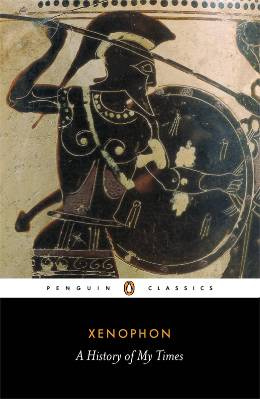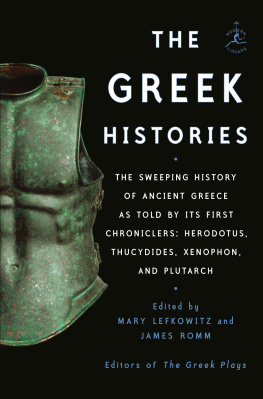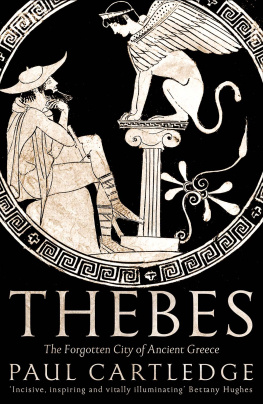
A HISTORY OF MY TIMES
ADVISORY EDITOR: BETTY RADICE
XENOPHON was an Athenian country gentleman born in the early 420s B.C. He may have helped to publish Thucydides History and certainly wrote his own Hellenica, also known as A History of My Times, as a continuation of it. By his own (probably reliable) account he was a fine officer and outstanding leader, but his admiration for Sparta and devotion to Socrates, among other causes, led to his banishment. He was given an estate at Scillus, near Olympia, and settled down to enjoy the life of a landed aristocrat under Spartan protection, and it was during this period that he began to write histories, biographies, memoirs and specialist treatises. Events forced him to move to Corinth in 371, but he was allowed to return to Athens in 365, where he lived until his death in the late 350s.
REX WARNER was a Professor of the University of Connecticut from 1964 until his retirement in 1974. He was born in 1905 and went to Wadham College, Oxford, where he gained a first in Classical Moderations, and took a degree in English Literature. He taught in Egypt and England, and was Director of the British Institute, Athens, from 1945 to 1947. He wrote poems, novels and critical essays, worked on films and broadcasting, and translated many works, of which Xenophons History of my Times and The Persian Expedition, Thucydides History of the Peloponnesian War, and Plutarchs Lives (under the title Fall of the Roman Republic) and Moral Essays have been published in Penguin Classics. Rex Warner died in 1986.
GEORGE CAWKWELL is a Fellow Emeritus of University College, Oxford. He has specialized in the history of Greece from the sixth to the fourth century B.C.
XENOPHON
A HISTORY OF MY TIMES
(HELLENICA)
TRANSLATED BYREX
WARNER
With an Introduction
and Notes by
GEORGE CAWKWELL
PENGUIN BOOKS
PENGUIN BOOKS
Published by the Penguin GroupPenguin
Books Ltd, 80 Strand, London WC2R 0RL, EnglandPenguin
Putnam Inc., 375 Hudson Street, New York, New York 10014, USAPenguin
Books Australia Ltd, 250 Camberwell Road, Camberwell, Victoria 3124, AustraliaPenguin
Books Canada Ltd, 10 Alcorn Avenue, Toronto, Ontario, Canada M4V 3B2
Penguin Books India (P) Ltd, 11 Community Centre, Panchsheel Park, New Delhi 110 017, IndiaPenguin
Books (NZ) Ltd, Cnr Rosedale and Airborne Roads, Albany, Auckland, New ZealandPenguin
Books (South Africa) (Pty) Ltd, 24 Sturdee Avenue, Rosebank 2196, South Africa
Penguin Books Ltd, Registered Offices: 80 Strand, London WC2R 0RL, England
www.penguin.com
This translation first published 1966
Reprinted with new Introduction and Notes 1979
23
Translation Rex Warner, 1966
Introduction and Notes George Cawkwell, 1979
All rights reserved
Except in the United States of America, this book is sold subjectto
the condition that it shall not, by way of trade or otherwise, be lent,
re-sold, hired out, or otherwise circulated without the publishersprior
consent in any form of binding or cover other than that inwhich
it is published and without a similar condition including thiscondition
being imposed on the subsequent purchaser
ISBN: 978-0-14-192685-8
CONTENTS
INTRODUCTION
THE Fourth century B.C. is a fascinating period of Greek history. it began with Sparta triumphant over Athens and seemingly secure; it ended with all Greece subject to Macedon dramatic changes which are of special appeal to an age which has seen and fears yet to see similar reversals of power and fortune. No one who cares for liberty can contemplate with detachment the decline of the city-states of Greece before the national state of Macedon, and the rise of Philip II in the 350s and the 340s will always have prior claim on mens interest, but if one is properly to understand it one must understand also how in the first four decades of the century the city-states reached a balance of impotence. Sparta undone by Thebes ceased to be a world power and became a mere Peloponnesian wrangler. Thebes proved unequal to her great pretensions and prompted a resistance in Central Greece which she could not easily suppress. Athens, dreaming of and constantly scheming to recover her Fifth-Century empire, wasted her resources and her credit, and by the accession of Philip in 359 was approaching bankruptcy and general contempt. Thus the first four decades of the century ended in uncertainty and confusion in Greece, which must be understood if we are to understand the sequel. Nor is the period without interest for itself. If Philip had died young and Macedon had remained disunited and weak, the age of Lysander, Agesilaus and Epaminondas would still have had wide appeal.
Of these troubled decades Xenophons Hellenica (commonly translated The History of Greece, here less closely but more aptly A History of My Times) is the only surviving formal account. There are fragments of other histories and late epitomes; there are speeches and inscriptions; and the study of these has led to a sharp decline in Xenophons credit. All this will become evident and the reader must be warned at the outset that he will be seriously misled if he believes all he reads in the Hellenica and if he neglects to read between the lines. But it should also be stated that, although we would not be without knowledge of the period if the works of Xenophon had perished, it would hardly seem worth the knowing. For all its faults as history, A History of My Times closely studied is a most engaging work, which stimulates great interest in the period it covers.
THE LIFE OF XENOPHON
Xenophon was born in Athens in the early years of the Peloponnesian War into the class of the Knights, men rich enough to maintain a horse and so render military service in the cavalry, which was at that stage 1,200 strong compared to the near 30,000 of military age in the hoplite class and to the unnumbered mass of those liable for service in the fleet or in the light-armed forces (Thucydides II.13). Such men of property found much to discontent them in the war. Their estates were liable to Spartan ravaging; those of military age were liable to the costly duty of commanding a ship in the Athenian navy: so they had a special interest in the ending of the war when opportunity offered. It did so in 425 but was rejected, and, although peace was made in 421, within a few years the disastrous Sicilian Expedition had brought Athens itself near to ruin. The oligarchicrevolution of 411 was the consequence, and, although it failed to maintain itself, the closing years of the war did nothing to make a young man of Xenophons sort an admirer of the Athenian system. We may presume that he had grown up amidst grumbling discontent at the very least; we may be sure that as a young man he conceived a lively contempt for democracy as it displayed itself in the last years of the Peloponnesian War. To judge by the precise detail of his account of a cavalry action in Ionia (I.2.1 ff.), which suggests autopsy, he was already old enough for military service by 409 and for the right to attend the debates in the assembly. It is therefore possible that he was present in person at one of the most discreditable performances of the Athenian democracy, the trial of the generals after the naval-battle of Arginusae in 406 (I.7.1 ff.); they were, in defiance of the law and Socrates attempt to uphold it (15), condemned en bloc. Whether Xenophon was present or not, clearly enough he was appalled, his sympathies being attested, as is his manner, by the length of the speech he put into the mouth of Euryptolemus (1633) pleading for respect for the due procedure of the law. Indeed there can be no doubt that he despised democracy. Although he had nothing but contempt for the leader of the oligarchic revolution of 404, as emerges perhaps from his account of the arrest and execution of Theramenes (II.3.1556), certainly from the account he gave in the















